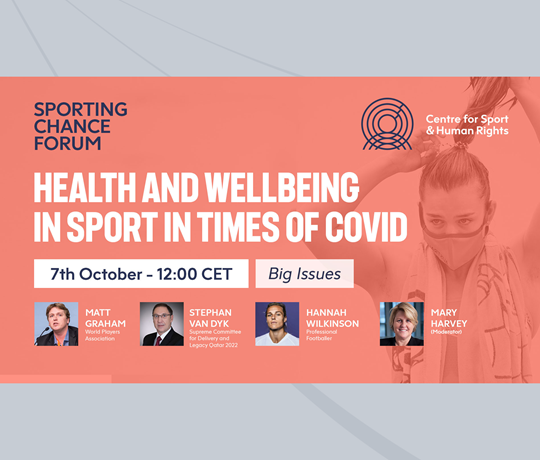Health and Wellbeing in Sport in Times of COVID
Session Summary
The COVID-19 Pandemic has impacted the physical and mental health and wellbeing of billions of people worldwide, athletes and those working in and around sport are no exception. With a radically disrupted sporting calendar in 2020, many athletes were unable to compete for extremely long periods, and those able to compete in elite sports have been subject to unfamiliar constraints such as quarantines, testing and empty stadiums.
For athletes and particularly those participating in team sports such as Hannah Wilkinson, the isolation and restriction to train with other teammates was particularly damaging. COVID and lockdowns were comparable to sustaining an injury. However, with an injury there is a usually a defined period of time that athletes cannot play, whereas this has not been the case with the pandemic. Uncertainty about the length and course of the pandemic undoubtedly affects the physical ability to maintain form, but the psychological state is the most difficult to retain.
Many athletes have now spoken up about mental health. When discussing athlete health, this is no longer limited to physical health, but also recognised as encompassing mental health. There has been a push by UNI Global Union along with other global union federations to have this recognised as one of the ILO’s fundamental labour conventions. This would be significant as it would enhance obligations on governments to ensure these standards are protected for workers.
Mental health has also been considered for construction workers linked to sport. The Supreme Committee for Delivery and Legacy Qatar 2022 undertook a mental health campaign for workers, focusing on stress, depression and anxiety.
COVID set back some of the progress for gender equality. When the pandemic hit, while men’s sport was largely prioritised
Economic effects - many athletes suddenly were not getting paid and it exacerbated widespread problems. According to Matt Graham, 45% of EU athletes affiliates had cases where players contracts had been unlawfully terminated or unilaterally changed. UNI Global and the World Players’ Association supported return to safe work and play for athletes and convened a number of exchanges with affiliates to support negotiations.
Health impacts for construction workers must be considered to ensure proper implementation of safety guidelines, with action needing to be prioritised on four critical areas: risk assessments; maintaining close communication with workers, (including grievance platforms such as Workers Welfare Forums); welfare inspections; and isolation measures. There is a need for a focus on risk assessments, and strong communication with stakeholders from the outset.
As the pandemic continues to impact daily lives, there is a need to consistently review the measures used to ensure that they are responding to the relevant prevailing challenges.
Watch the full session here
Click here to watch the SCF21 sessions on demand on YouTube